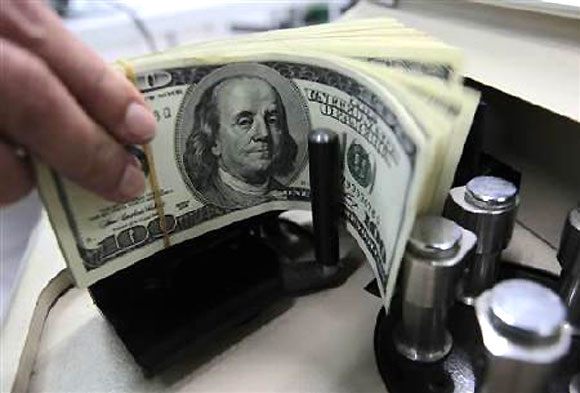Photographs: Reuters Swati Pandey and Nishant Kumar in Mumbai/Hong Kong
The government will have to pay between 5% and 6% on domestic dollar deposits for a 5-year period if it wants to lure overseas Indian money.
India's multi-million-strong diaspora is patriotic up to a point. In fact their patriotism may amount to 5 or 6 percentage points of annual investment returns when it comes to providing the hard currency needed to revive the rupee.
After announcing short-term measures this month to put a floor under the falling rupee, Indian authorities are contemplating longer-term steps to plug a deep current account deficit to help prop up the currency.
New Delhi is considering the time-tested recipe of raising money from non-resident Indians (NRIs) via debt or deposits, senior government sources said on Monday. The government said all options to support the rupee are on the table, although the sources said tapping NRIs was considered a better option at this time than issuing a sovereign bond.
"The government may not get terms as favourable as they might like but the cost of borrowing would be lower than onshore, and that's an incentive," said Philip McNicholas, BNP Paribas economist in Hong Kong.
"An NRI bond issue could be a quick and easy way to raise dollars as it may face less political push-back and you are tugging at the heartstrings of the diaspora," he said.
Bankers and analysts estimate the government will have to pay between 5 per cent and 6 per cent on domestic dollar deposits for a 5-year period if it wants to lure overseas Indian money.
"The sweetest of the sweet spot will be five years and 5 per cent," said a private banker with a Swiss Bank in Hong Kong, whose clients include NRIs.
Click on NEXT for more...
Pay high premium to 'buy patriotism'
Photographs: Sukree Sukplang/Reuters
At 5 per cent, that would be at least 370 basis points over benchmark US treasuries, higher than the returns on bonds and deposits in 1998 and 2000 - the last time India tapped its diaspora to support a weakening currency - of about 250 basis points over US treasuries.
"The economy had better prospects in the 1990s," said a non-resident Indian banker in Singapore. "The services sector was opening up too then."
Now, weak foreign direct investment and a record current account deficit suggested investors would demand a premium to part with their money.
"How will India fund its dollar bill?" he said.
Those risks and the uncertainty of a general election due by 2014 also suggested NRIs will be reluctant to commit funds beyond five years, the bankers and analysts said.
It may be tougher to entice the estimated 25 million NRIs globally to invest in rupee-denominated bonds or deposits because they will carry the currency risk.
The rupee has fallen close to 8 percent against the dollar so far this year, second only to the Japanese yen in rankings of the weakest currencies in Asia monitored daily by Reuters. It hit a record low of 61.21 on July 8 and was trading on Tuesday around 59.75.
While some investors may be attracted by the prospect of capital appreciation in the record-low rupee, coming on top of an attractive coupon yield, some are not convinced the currency will not weaken further.
"Even at a 12 per cent interest rate, they won't find anyone willing to buy rupee bonds," said the Indian banker based in Singapore.
That would be at least 300 basis points over the rate banks currently offer on non-resident rupee deposits and compares with an 8.5 per cent yield on five-year government bonds.
Click on NEXT for more...
Pay high premium to 'buy patriotism'
Photographs: Reuters
Tapping your own
With the world's second-biggest diaspora, according to the Ministry of Overseas Indian Affairs, it is no surprise India turns to its citizens for help.
Central bank figures show non-resident Indians (NRIs) held $58 billion in dollar deposits in India as of September 2012, plus local currency deposits worth Rs 3 trillion.
In the midst of a balance-of-payments crisis in 1991, India used a tax-forgiveness plan for NRIs to get them to bring money home.
In 1998, it issued a five-year Resurgent India Bond offering 7.75 per cent in dollar terms, raising more than $4 billion.
In 2000, it raised $5.5 billion through an India Millennium Deposit scheme, which paid 8.5 per cent for 5-year dollars.
Wealthier investors may need more sweeteners, such as the ability to leverage the investment by say four times, the private banker said. That would imply an enhanced yield of 13-14 per cent on a dollar deposit.
The current account deficit amounted to $87.8 billion in the financial year to March 31, a record 4.8 per cent of GDP. Although one government source said on Monday the government could try to raise as much as $20 billion via NRIs, bankers said such a target would be tough to reach.
"It is ambitious," said Abraham Chacko, executive director at Federal Bank, a private-sector bank in India with assets of $12 billion.
"We (India) get about $60 billion a year, so talking about $20 billion now is ambitious. But it will be higher than in the previous years."
Additional reporting by Umesh Desai in Hong Kong





article